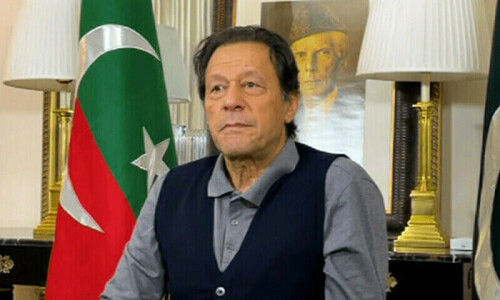
ISLAMABAD: Former president retired General Pervez Musharraf may well be a free man, after the Supreme Court lifted a ban on his foreign travel on Wednesday by upholding a June 12, 2014, Sindh High Court (SHC) order that called for removing his name from the Exit Control List (ECL).
But the order from the top court came with the rider that the federal government or the three-judge special court trying the retired general for treason was free to make decisions to regulate his custody or restrict his movement.
“Until the government issues an administrative order, there is no bar on Musharraf to travel inside or outside the country,” Chaudhry Faisal Hussain, who assisted Barrister Farogh Naseem in defending the former president, commented soon after the order was handed down.
But any decision to this effect, he explained, will be subject to the SHC order, which had held that the mere pendency of a case against Mr Musharraf was no grounds to deny him the fundamental right of travelling within or outside Pakistan.
Court says govt may pass any order on the issue
“For reasons to be recorded separately, this appeal is dismissed,” Chief Justice Anwar Zaheer Jamali dictated while heading a five-judge Supreme Court bench.
“However, this order will not preclude the federation of Pakistan or the special court, seized with the proceedings under Article 6 (high treason) of the constitution against Gen (retd) Pervez Musharraf from passing any legal order for regulating his custody or restricting his movement,” the order said.
Similarly, an urgent application moved by Musharraf, seeking a one-time permission for his treatment abroad, was also dismissed by the court since it was not pressed by his counsel.
“I am thankful to God and the highest court in the land, whose decision has lifted the travel restriction on Musharraf. Now, he does not need permission from any quarters if he decides to leave the country,” Barrister Farogh Naseem said.
However, Advocate Sheikh Ehsanuddin, who represents former chief justice Iftikhar Mohammad Chaudhry as his spokesman, deprecated the federal government’s attitude, saying they had failed to show seriousness in such a high-profile case.
“The government failed to come out with a clean hand as it did not properly assist the court by informing it about the non-bailable warrants, issued by a lower court against Musharraf in the Ghazi Abdul Rashid murder case,” he said, adding that if Musharraf left the country, it would render the proceedings against him ineffective.
Later, All Pakistan Muslim League (APML) Secretary General Dr Mohammad Amjad announced in a statement that Pervez Musharraf would definitely return to Pakistan after surgery on his fractured spine.
Earlier, asked about the government’s stand on the issue, Attorney General Salman Aslam Butt simply told the larger bench that the government was subject to the will of the Supreme Court since it had placed Musharraf on the ECL in compliance with the court’s April 8, 2013, directions.
But the court wondered how the federal government could rely on an interim order when the order had been merged with the final judgement of July 3, 2013, and not separately endorsed in the verdict.
During the proceedings, the chief justice also expressed reservations on a medical report, issued by a specialist from the Ziauddin Hospital in Karachi, saying that such certificates could be easily procured.
Justice Mian Saqib Nisar then asked who was responsible for putting any individual’s name on ECL. At this, the AG replied that Musharraf was placed on the ECL under Section 2f of the Exit from Pakistan Control Rules, 2010, which asks to enter names in the list under the court’s directions. “I am simply complying with the orders of the apex court,” the AG said.
“Your predicament is that you do not want to own anything, rather you want to pass the buck on to the court,” deplored Justice Nisar.
Farogh Naseem, meanwhile, reminded the bench that the special court order of March 31, 2014, had held that it did not want to put any restriction on the former president’s movement.
Closing the case, the chief justice regretted that the government did not want to do anything on its own and was taking shelter behind the apex court order of April 8.
“If the government thinks that Musharraf should not leave the country, then it is free to pass any order,” the chief justice said, adding the government wanted the court to regulate Musharraf’s movement, which was actually the government’s job.
Separately on Wednesday, an interior ministry spokesperson clarified that the ministry had yet to formally receive the apex court’s instructions, and that until such orders were received, Musharraf’s name would remain on the ECL.
Published in Dawn, March 17th, 2016












































